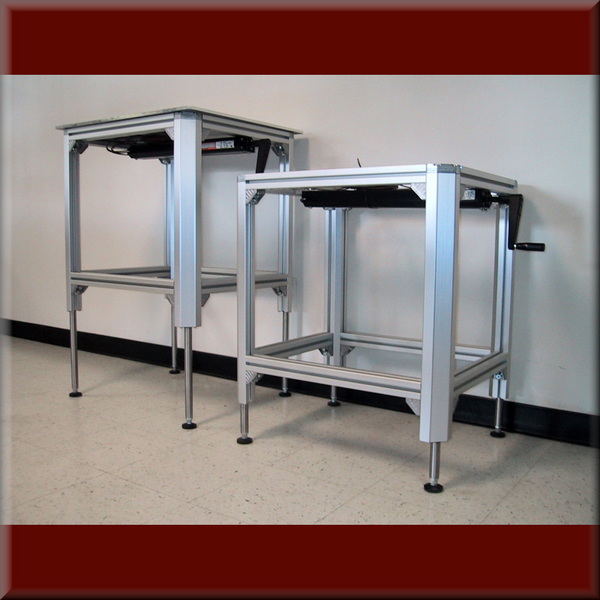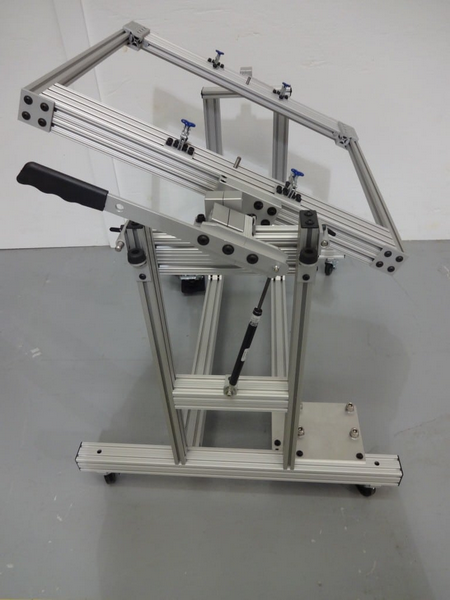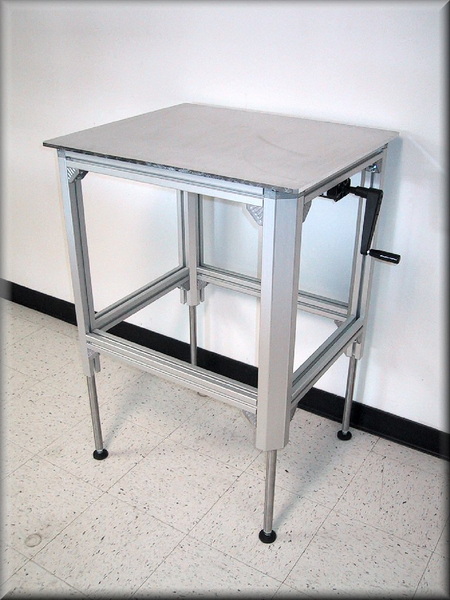Content Menu
● Introduction
● The Advantages of Aluminum Extrusion Tables
>> Lightweight Yet Strong
>> Corrosion Resistance and Durability
>> Adjustable and Modular Design
>> Precision and Accuracy
>> Easy Maintenance
● Choosing the Right Aluminum Extrusion Table
>> Size and Weight Capacity
>> T-Slot Design
>> Customization Options
● Applications of Aluminum Extrusion Tables
>> Industrial and Manufacturing Applications
>> CNC Machining and Robotics
>> Laboratory and Cleanroom Environments
>> DIY Projects and Home Workshops
● Maintenance and Care
>> Regular Cleaning
>> Inspect for Damage
>> Lubricate Moving Parts
● Conclusion
>> Related Questions
>> 1. What is an aluminum extrusion table?
>> 2. How do I maintain my aluminum extrusion table?
>> 3. Can I customize my aluminum extrusion table?
>> 4. What are the common applications of aluminum extrusion tables?
>> 5. Why should I choose an aluminum extrusion table over a traditional workbench?
Introduction
In the world of workshops and manufacturing, the tools and equipment you choose can significantly impact your productivity and efficiency. One such tool that has gained immense popularity is the aluminum extrusion table. These tables are not only versatile but also offer a range of benefits that make them an ideal choice for various applications. In this article, we will explore the numerous advantages of using an aluminum extrusion table in your workshop, how to select the right one, and the various applications they serve.

The Advantages of Aluminum Extrusion Tables
Lightweight Yet Strong
One of the most significant benefits of aluminum extrusion tables is their lightweight nature. Aluminum is known for its high strength-to-weight ratio, which means you can have a sturdy work surface without the bulkiness of traditional materials like steel or wood. This lightweight characteristic makes it easier to move the table around your workshop, allowing for greater flexibility in your workspace.
Corrosion Resistance and Durability
Aluminum is naturally resistant to corrosion, which is a crucial factor in maintaining the longevity of your equipment. Unlike wood, which can warp or rot over time, or steel, which can rust, aluminum extrusion tables can withstand various environmental conditions. This durability ensures that your investment will last for years, even in demanding workshop environments.
Adjustable and Modular Design
Aluminum extrusion tables often feature a modular design, allowing users to customize their workspaces according to their specific needs. The T-slot design enables easy attachment of accessories, such as clamps, shelves, and other tools, making it simple to adapt the table for different tasks. This adjustability is particularly beneficial for workshops that handle a variety of projects, as it allows for quick reconfiguration without the need for specialized tools.
Precision and Accuracy
For tasks that require precision, such as CNC machining or woodworking, an aluminum extrusion table provides a stable and flat surface that enhances accuracy. The rigidity of aluminum ensures that the table does not flex or warp under pressure, allowing for consistent results in your projects. This precision is essential for professionals who rely on exact measurements and high-quality finishes.
Easy Maintenance
Maintaining an aluminum extrusion table is straightforward. The surface can be easily cleaned with mild detergents and water, and there is no need for special treatments or coatings. This ease of maintenance saves time and effort, allowing you to focus on your work rather than worrying about the upkeep of your equipment.
Choosing the Right Aluminum Extrusion Table
When selecting an aluminum extrusion table for your workshop, there are several key factors to consider:
Size and Weight Capacity
Determine the size of the table that will best fit your workspace and the types of projects you plan to undertake. Additionally, consider the weight capacity of the table to ensure it can support the tools and materials you will be using.
T-Slot Design
Look for tables with a T-slot design, as this feature allows for easy attachment of accessories and modifications. The versatility of T-slots enables you to customize your table to suit various tasks, enhancing its functionality.
Customization Options
Many manufacturers offer customization options for aluminum extrusion tables. Consider whether you need specific features, such as adjustable height or additional storage solutions, and choose a table that meets those requirements.

Applications of Aluminum Extrusion Tables
Aluminum extrusion tables are used in a wide range of applications across various industries. Here are some common uses:
Industrial and Manufacturing Applications
In industrial settings, aluminum extrusion tables are often used for assembly lines, workstations, and material handling. Their durability and modular design make them ideal for environments where heavy machinery and tools are in use.
CNC Machining and Robotics
For CNC machining and robotic applications, precision is paramount. Aluminum extrusion tables provide a stable and accurate surface for these operations, ensuring that components are machined to exact specifications.
Laboratory and Cleanroom Environments
In laboratories and cleanrooms, cleanliness and organization are critical. Aluminum extrusion tables can be designed to meet specific cleanliness standards, and their easy-to-clean surfaces help maintain a sterile environment.
DIY Projects and Home Workshops
For hobbyists and DIY enthusiasts, aluminum extrusion tables offer a versatile solution for various projects. Whether building furniture, crafting, or working on electronics, these tables can be easily adapted to suit individual needs.
Maintenance and Care
To ensure the longevity of your aluminum extrusion table, follow these maintenance tips:
Regular Cleaning
Keep the surface clean by wiping it down with a damp cloth and mild detergent. Avoid using abrasive cleaners that could scratch the surface.
Inspect for Damage
Regularly inspect the table for any signs of wear or damage. Address any issues promptly to prevent further deterioration.
Lubricate Moving Parts
If your table has adjustable components, ensure that you lubricate them periodically to maintain smooth operation.
Conclusion
In conclusion, aluminum extrusion tables offer a multitude of benefits that make them an excellent choice for any workshop. Their lightweight yet strong construction, corrosion resistance, adjustable design, and ease of maintenance make them ideal for a variety of applications. Whether you are a professional in an industrial setting or a DIY enthusiast at home, investing in an aluminum extrusion table can enhance your productivity and efficiency.

Related Questions
1. What is an aluminum extrusion table?
An aluminum extrusion table is a work surface made from aluminum extrusions, designed for versatility and strength. It often features a modular design with T-slots for easy attachment of accessories.
2. How do I maintain my aluminum extrusion table?
To maintain your aluminum extrusion table, regularly clean the surface with mild detergent, inspect for damage, and lubricate any moving parts to ensure smooth operation.
3. Can I customize my aluminum extrusion table?
Yes, many manufacturers offer customization options for aluminum extrusion tables, allowing you to tailor the table to your specific needs, including size, height, and additional features.
4. What are the common applications of aluminum extrusion tables?
Aluminum extrusion tables are commonly used in industrial settings, CNC machining, robotics, laboratories, and home workshops for various projects.
5. Why should I choose an aluminum extrusion table over a traditional workbench?
Aluminum extrusion tables offer advantages such as lightweight construction, corrosion resistance, modular design, and precision, making them a superior choice for many applications compared to traditional workbenches.













